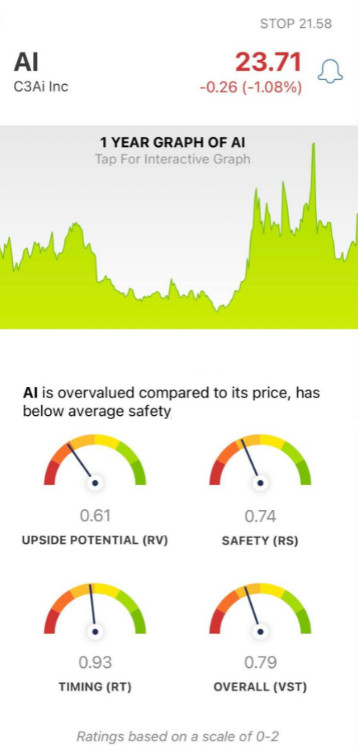20 Good Suggestions For Choosing Ai Trading Bots
20 Good Suggestions For Choosing Ai Trading Bots
Blog Article
Top 10 Tips For Utilizing Sentiment Analysis For Ai-Powered Stock Trading From Penny To copyright
When it comes to AI trading in stocks, using sentiment analysis is a powerful method to gain an understanding of the behavior of markets. This is especially true for penny stocks and copyright where sentiment plays an important impact. Here are ten tips to use the power of sentiment analysis for these markets.
1. Learn the significance of Sentiment Analysis
Tip: Recognize the way that sentiment influences short-term changes in prices, especially in speculative investments such as penny stock and copyright.
The reason: Public sentiment can often be a signpost to price actions. This makes it a valuable signal for trading.
2. AI for analysis of multiple sources of data
Tip: Incorporate diverse data sources, including:
News headlines
Social media (Twitter, Reddit, Telegram, etc.)
Blogs and forums
Press releases and earnings announcements
The reason: Broad coverage offers an extensive picture of the mood.
3. Monitor Social Media In Real Time
Tips: Use AI tools like StockTwits, Sentiment.io, or LunarCrush to monitor discussions that are trending.
For copyright For copyright: Concentrate on influencers and discussions around specific tokens.
For Penny Stocks: Monitor niche forums like r/pennystocks.
The reason: Real-time monitoring can help capitalize new trends.
4. The focus is on measures of sentiment
Pay close attention to the following metrics:
Sentiment Score: Aggregates positive vs. negative mentions.
Tracks the buzz or hype about an asset.
Emotion Analysis: Assesses fear, excitement or the feeling of uncertainty.
Why: These metrics can offer insight into the market's psychology.
5. Detect Market Turning Points
Tip: Use sentiment analysis to find extremes (market peaking), or negativity, (market bottoms).
Strategies that are counter-intuitive thrive in extreme situations.
6. Combining sentiment with technical indicators
TIP: Confirm sentiment using standard indicators, such as RSI, MACD or Bollinger Bands.
The reason: An emotional reaction could be misleading, whereas a scientific analysis provides context.
7. Integration of sentiment data automatically
Tips: AI trading bots should incorporate sentiment scores into their algorithms.
Why? Automated systems provide quick response to shifts in sentiment in market volatility.
8. Account to Manage Sentiment
Tip: Be wary of scams that use pump-and-dump and false news, particularly in penny stocks and copyright.
How do I use AI software to identify anomalies.
The reason: Identifying a manipulation shields you from fake signals.
9. Backtest Sentiments-Based Strategies
Examine the effect of past market conditions on trading based on sentiment.
The reason: By doing this you will be able to make sure that sentiment analysis is an an important part of your trading strategy.
10. Track the Sentiment of Influencers and Key Influencers.
Tips: Use AI to track market influencers. They could be notable analysts, traders or copyright developers.
For copyright For copyright: Focus on tweets, posts and other content by Elon Musk (or other blockchain pioneers).
Follow the industry's analysts and activists to find Penny Stocks.
What is the reason? Influencer opinion can significantly influence market perception.
Bonus: Combine Sentiment and Fundamental Data with On-Chain
Tip: Combine the sentiment of penny stocks (like earnings reports) as well as on-chain data to track copyright (like wallet movement).
The reason: Combining different data types can provide an overall picture and decrease dependence solely on sentiment.
With these tips you can make use of sentiment analysis in the AI-based strategies you employ to trade both for penny stock and copyright. Have a look at the most popular ai investing app url for site info including best ai for stock trading, ai predictor, best stock analysis app, ai for stock trading, stocks ai, ai penny stocks, best ai stocks, copyright predictions, trading chart ai, ai trade and more. 
Top 10 Tips On Improving Data Quality Ai Stock Pickers For Predictions, Investments And Investments
In order to make AI-driven investments selection, stock selection, and predictions, it is essential to focus on the quality of data. AI models can provide more accurate and reliable predictions when the data is of high-quality. Here are 10 ways to ensure high-quality data for AI stock pickers.
1. Prioritize clean, well-structured data
TIP: Make sure that your data is clean free of errors, and organized in a consistent format. This includes removing duplicate entries, handling data that is missing, and making sure you are ensuring the integrity of your data.
Why: AI models can process data more effectively with clean and structured data, leading to better predictions and fewer mistakes when making a decision.
2. Timeliness and real-time information are important
Utilize real-time market data to make accurate predictions. This includes stock prices, trading volumes and earnings reports.
Why: Timely market data helps AI models to accurately reflect current market conditions. This helps in making stock picks which are more reliable, especially for markets that have high volatility such as penny stocks and copyright.
3. Source data provided by reliable providers
TIP: Choose data providers with a good reputation and who have been independently verified. This includes financial statements, economic reports about the economy as well as price data.
Why: By using reliable sources, you reduce the chance of data inconsistencies or mistakes that may undermine AI model performance. This could cause false predictions.
4. Integrate multiple data sources
TIP: Use various data sources, such as news and financial statements. It is also possible to combine macroeconomic indicators with technical indicators such as RSI or moving averages.
Why: A multisource approach provides an overall view of the market which allows AIs to make more informed choices by capturing different aspects of stock behavior.
5. Backtesting: Historical data is the primary focus
Tips: Gather quality historical data prior to backtesting AI models in order to assess their performance at different market conditions.
The reason: Historical data helps to refine AI models. It also allows the simulation of strategies to evaluate returns and risks.
6. Continuously check the data's quality
TIP: Ensure you are regularly checking the quality of your data and confirm the accuracy by looking for inconsistencies. Also, you should update any outdated information.
The reason: Continuously validating data ensures its accuracy and minimizes the risk of making incorrect predictions using incorrect or outdated data.
7. Ensure Proper Data Granularity
TIP: Choose the best degree of data granularity to match your strategy. Make use of minute-by-minute information to conduct high-frequency trading or daily data to make long-term investment decisions.
Why: The correct granularity of data is vital for your model to achieve its objectives. For instance high-frequency trading data may be helpful for short-term strategies and data of better quality and less frequency is required for long-term investing.
8. Include other sources of data
You might want to consider using other sources of data such as satellite imagery, social media sentiment or web scraping to monitor market trends and news.
Why: Alternative information can provide your AI system a unique perspective on market behavior. It will also aid it compete by identifying patterns that conventional data might have missed.
9. Use Quality-Control Techniques for Data Preprocessing
Tip: Use quality-control measures like data normalization, outlier identification, and feature scaling before feeding raw data into AI models.
Why? Proper preprocessing allows the AI to make accurate interpretations of data that reduces the error of predictions and enhances model performance.
10. Track Data Drift and adjust Models
Tips: Always be on alert for data drift which is when data properties change over time - and adapt AI models accordingly.
What is the reason? A data shift can have a negative impact on model accuracy. By sensing and adapting to shifts in patterns of data you can ensure that your AI model is able to function for a long time, especially in volatile markets such as copyright or penny stocks.
Bonus: Keep an Information Loop to Ensure Improvement
Tip : Create a continuous feedback loop in which AI models continuously learn from performance and data results. This improves the data collection and processing methods.
Why: Feedback loops allow you to continuously enhance the accuracy of your data and to ensure that AI models are in line with current market developments and conditions.
In order for AI stock-pickers to realize their potential, it is essential to concentrate on data quality. AI models are more likely to generate accurate predictions if they are supplied with timely, high-quality and clean data. Follow these tips to ensure that your AI system has the best information for forecasts, investment strategies, and stock selection. See the top rated trade ai for more recommendations including ai trading platform, trading bots for stocks, artificial intelligence stocks, trading chart ai, ai copyright trading bot, ai stock trading, ai stock trading bot free, best ai for stock trading, ai investment platform, ai stock price prediction and more.